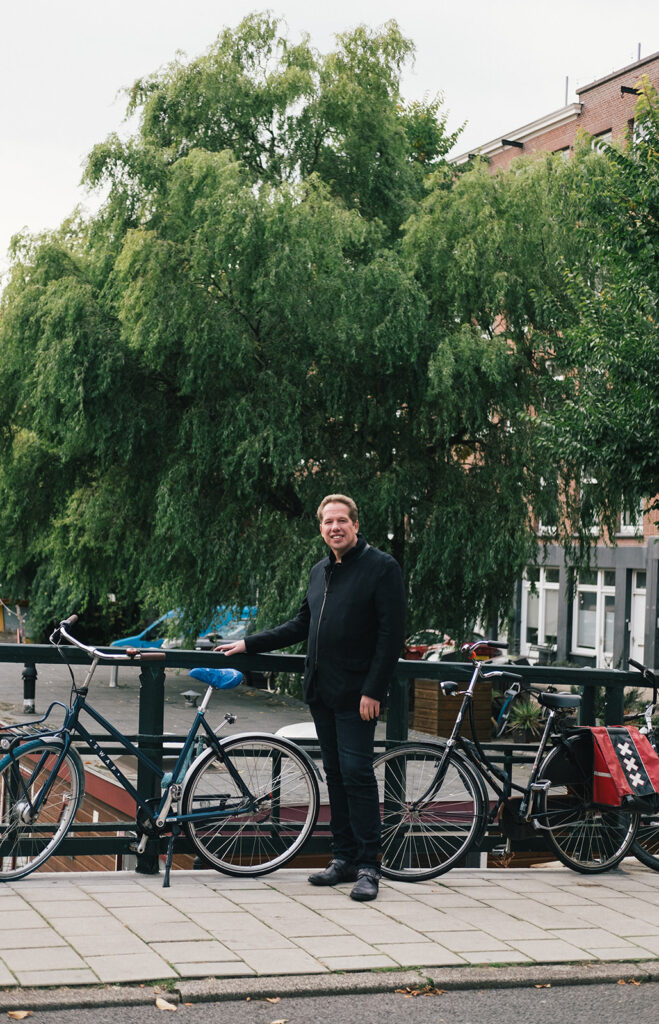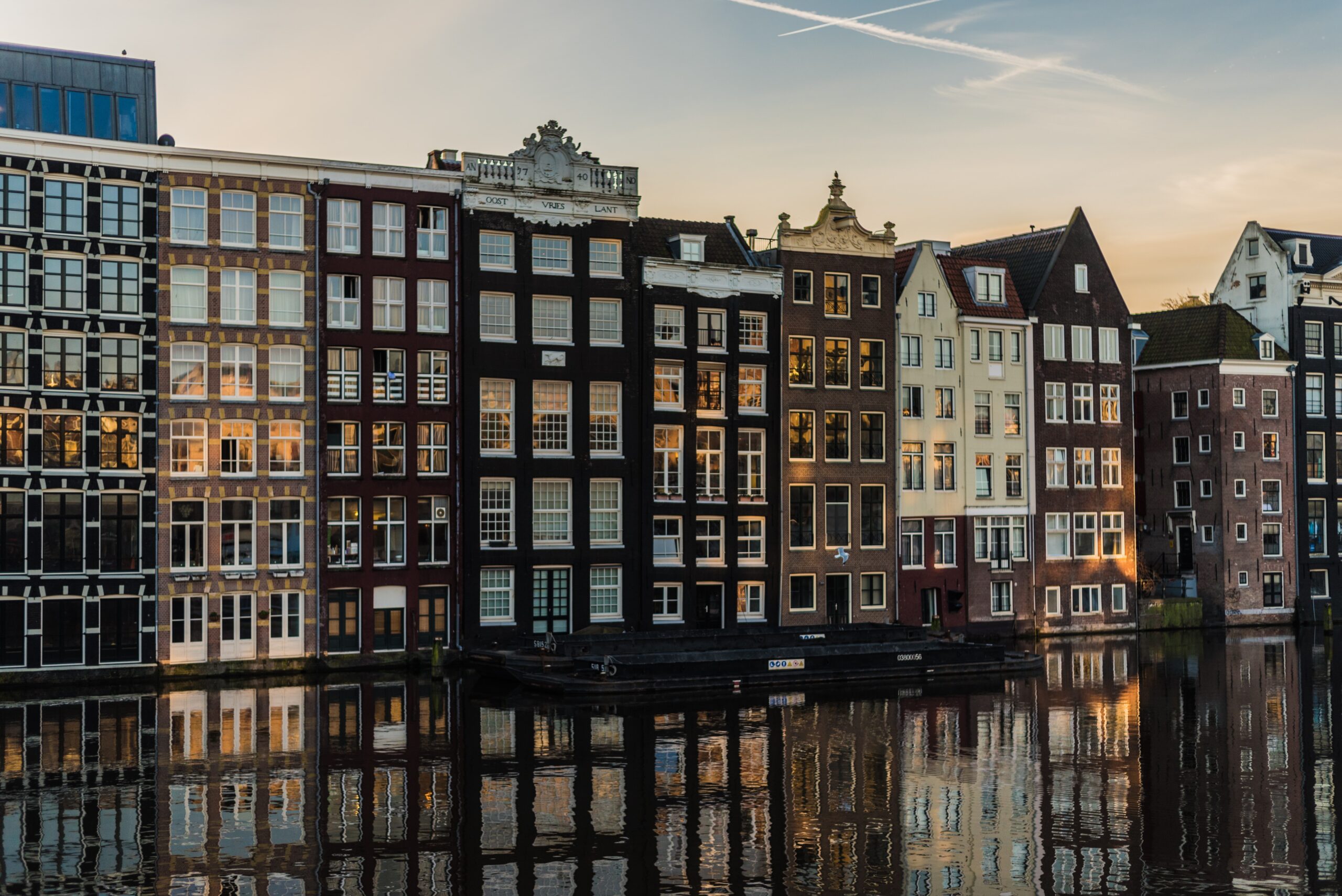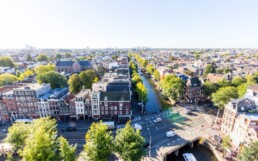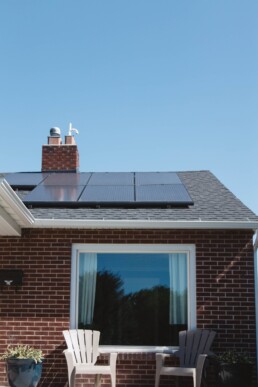Expert Tips for Bidding on a Home in the Netherlands
Bidding on a property is a skill honed over years of experience. Having an expert on your side, like Barry Burgemeester, can make all the difference. Barry combines diligence with extensive knowledge to help you get the best deal. We recently sat down with Barry to answer common questions about bidding on a home in the Netherlands.
What does it mean to 'bid' on a house in the Netherlands?
Bidding on a house shows your interest in purchasing it—it’s more than just a price offer; it's a proposal. Sellers consider factors like flexibility, financing conditions, and budget. If you're unsure about presenting yourself in the best light, a real estate agent can guide you through the process.
What happens during the bidding process?
Your real estate agent will draft and submit your offer to the seller or their agent. To make you an appealing candidate, your agent will help you create a compelling profile. With many competitors vying for the same property, thorough preparation is essential.
Why should I use a real estate agent to bid on a home?
Securing your dream home involves many fast-moving parts, often negotiated in Dutch. Without fluency in the language and familiarity with the market, it can be challenging to keep up. A skilled real estate agent ensures you bid on properties that offer good value and fit your budget.
What should I know about overbidding?
The Amsterdam market is highly competitive, often requiring overbids. Determining the right amount to overbid is tricky, but a seasoned real estate agent can provide strategic advice to benefit both you and the seller.
How do I finance a bid when overbidding?
Before bidding, you need to understand the extra costs involved in overbidding. A real estate agent like Barry, with his extensive experience, can help you estimate the total cost. This way, you can secure your finances and be ready to act quickly.
What happens if I win the bid?
Congratulations! But remember, the initial verbal agreement or email confirmation isn't binding. A deal becomes binding only after all parties sign the sale and purchase agreement. Barry will guide you through this process smoothly and answer all your questions.
Get in Touch with Barry Burgemeester
Bidding can be daunting, especially in an unfamiliar market. However, with the right real estate agent, you can feel confident that your interests are prioritized. For a free consultation, email info@burgemeestervastgoed.nl today.
About Barry Burgemeester
Barry Burgemeester is a certified real estate agent with over 23 years of experience. Originally from Utrecht, he is passionate about helping clients in Amsterdam and beyond. Specializing in assisting expats, Barry expertly guides them through finding their dream home every step of the way.
The Dutch Housing Market: Trends, Government Plans, and Practical Tips
The housing market in The Netherlands is marked by high demand and limited supply, with the average house price now at €434,000. Haarlem, with an average price of €576,000, is the most expensive city, reflecting intense competition in urban areas. Even the outskirts of towns and regions like Limburg are experiencing high demand, creating a nationwide seller’s market where 56% of homes are sold above the asking price. Buying a house is quite a challenge, especially in the Amsterdam region, where only about 30% of people own homes. We will try to explain what is happening.
Government Housing Initiatives
One of the steps made to address these issues is the government’s plan to redistribute housing construction to the eastern and northern regions of the country. These areas offer more space and are less prone to flooding, aligning with climate resilience goals. This strategy aims to reduce pressure on the west and south, stimulate local economies, and foster balanced regional development.
Construction Challenges
However, the construction sector faces significant hurdles. Only 55,000 permits for new builds were issued last year, far below the needed number. High construction and labor costs and bureaucratic challenges make it difficult to scale up housing development, worsening the supply shortage.
New Builds vs. Existing Homes
Newly built homes offer several advantages: they are more sustainable, require less maintenance, and come with guarantees for any issues. However, high ground costs, construction expenses, and long building times can significantly impact your financial situation. For those needing a bridging loan to transition between homes, it is crucial to understand the terms set by banks. Such loans are less common now, and banks are more stringent. Finding an existing home might be a challenge, but the time from purchase to move-in is short, allowing you to enjoy your new home quickly.
Mortgage Rates and Financial Considerations
Current mortgage rates average 3.91% for a 10-year term, but banks are increasingly cautious. Securing a mortgage can be challenging if you do not have a steady job or have other financial obligations. Potential buyers need to be well-prepared and understand the stringent requirements that banks now impose.
Rental Market and “Wet Betaalbare Huur”
Homeownership is increasingly unaffordable for many, and the rental market also faces shortages. The new “Wet Betaalbare Huur” law aims to ensure fairer rents, with the government estimating that 300,000 homes will have to lower their rents. This law is controversial; while it seeks to protect tenants, it may lead developers and investors to sell properties, reducing rental availability and discouraging new construction.
Practical Tips for Navigating the Housing Market
- Seek Professional Guidance: Always consult with a real estate professional to help navigate the complexities of the market.
- Stay Realistic: Adjust your Wishlist to match what is feasible within your budget and the current market conditions.
- Set Priorities: Clearly define your priorities and follow the advice of experts to make informed decisions.
- Important Clauses: Do not skip critical clauses like financing reservations and surveys, even if it seems convenient.
- Set Boundaries: Establish clear boundaries for what you can afford and what compromises you are willing to make.
- Be Prepared and Patient: Be ready for a competitive market and practice patience as finding the right home may take time.
Conclusion
As a certified real estate agent with over 23 years of experience helping expats buy homes in the Amsterdam area, I understand the complexities of the Dutch housing market. With significant imbalances and regional disparities, navigating these challenges effectively is crucial. Government initiatives aim to promote sustainable growth, but new rental laws and construction hurdles add layers of complexity. You can find your dream home by staying informed and following practical tips.
For personalized assistance, feel free to email me at info@burgemeestervastgoed.nl
High Demand for Homes in Amsterdam
I have more than 20 years of experience assisting expats in finding homes. Amsterdam's popularity as a place to live has surged, but the housing supply hasn't kept up with the demand. Unlike many cities where more people own homes, Amsterdam is different. Only about 30% of properties in the city are owner-occupied.
Now, in my professional opinion, I'll dissect the situation step by step to provide a clear understanding. The majority of properties in Amsterdam are used for social housing, offices, and other purposes, which significantly limits the number of available homes for purchase. This supply-demand mismatch makes it tough, but not impossible, for people to find suitable places to live.
A Natural Shortage explained
- Homes Are Getting More Expensive
Houses in Amsterdam are becoming fancier and pricier. This is good news if you can afford to buy a great home, but it's a problem for many others. We don't see an end to it – prices in the middle and upper segments, going over 500,000 euros, are expected to keep going up. Meanwhile, the lower-priced homes are in high demand, with an average of 11 people wanting to buy each one, which means prices are going up there too.
- Building New Homes Is Slow
In a lot of places, making new houses helps when there aren't enough. But in Amsterdam, it's not happening fast. Why? Well, there's not much space, strict rules about building, and it costs a lot to build, so it's tough to match the growing need.
- Tangled Up in Rules
Amsterdam's housing market is caught in a web of rules and regulations. Some are important for the environment and safety, but too many can tangle up construction and slow things down. This only adds to the challenge of finding a suitable home.
In a nutshell, Amsterdam's housing problem is complex. With only approximately 30% of homes owned and the rest used for social housing and other purposes, the city faces unique challenges. Finding solutions to make Amsterdam more accessible to everyone is essential. Keep in mind, that I don't have a crystal ball, and like all complex topics, government policies play a significant role. Hopefully, we'll see progress, but it might not be immediate.
Why a Certified Real Estate Agent Matters
Amsterdam's housing market is quite competitive. That's why having a certified and well-known real estate agent with you, like me, is super important. Homes for sale can come and go fast, and a pro can be a big help. Agents like me understand the market well. We can act quickly when new homes are listed and help you make smart choices.
In the Netherlands, real estate agents get paid by either the seller or the buyer, not both. So, selling agents prefer working with people who have professionals on their side because it makes deals more likely to succeed. Having a trusted agent can be the secret to finding your dream home in Amsterdam's challenging housing market.
If you'd like to chat or have any questions, feel free to reach out via info@burgemeestervastgoed.nl.
Decoding the current avarage house prices in Amsterdam
 Buying a home in Amsterdam? The actual average house price is currently € 571 568, but what does that say?
Buying a home in Amsterdam? The actual average house price is currently € 571 568, but what does that say?
As a certified purchase agent with over 23 years of experience, I know that when it comes to property prices, it’s essential to understand that prices can vary significantly from street to street, but how is that?
In Amsterdam, each neighbourhood has its own unique charm, character, and amenities, which can influence property values. But even within the neighbourhood prices can differ significantly. Certain streets are more desirable and more expensive per m2 price than other streets, so the average and current price per m2 of € 7 189, is not standard for all homes.
When it comes to determining property prices, several crucial factors come into play. Factors such as size, condition, layout, and renovations all significantly impact the value of a property. Additionally, even within the confines of a single neighbourhood, you may find a diverse range of properties on the same street, each possessing unique characteristics that contribute to price variations.
Therefore, relying solely on average prices may not provide an accurate representation of the dynamic real estate market. Evaluating the market value of each property individually is of utmost importance.
How About the future prices?
Predicting home prices in Amsterdam is a complex task influenced by numerous factors. While I don’t possess a magic ball, my expertise and knowledge of the market and recent sales are the basis of my advice.
Currently, the housing market in Amsterdam is extremely tight, with significantly more demand than supply. This has resulted in a competitive market for buyers. The demand for homes in Amsterdam continues to rise steadily, driven particularly by the city’s popularity. In Amsterdam, we only have 33% home ownership, so that explains a lot.
Over the past couple of years, we have been fortunate to benefit from remarkably low mortgage rates. However, it is encouraging to witness these rates gradually stabilizing towards more typical levels. As a result, it’s important to acknowledge that borrowing capacities may be slightly reduced due to the rise in mortgage rates, so it is always wise to visit a bank or a mortgage advisor and get your numbers clear.
It is crucial to emphasize that the housing shortage in the market continues to persist, driving sustained demand for available properties. The reality is that finding a desirable home remains a challenging task, as there are multiple interested buyers for every property available.
What now?
So, if you are considering purchasing a home in Amsterdam, I provide a tailored approach that considers your unique requirements, preferences, and budget. We do not work with multiple clients who have the same criteria, as we believe in avoiding competition among our clients, we will keep you safe and we work on a no-cure/no-pay base.
Rest assured, if you maintain a realistic view and are open to following our advice, we are committed to finding you an exceptional home where you can create lasting memories.
Call me today for a personalized consultation, and let’s embark on this exciting journey together!
The Energylabel
The Netherlands has been at the forefront of adopting policies and initiatives to reduce energy consumption and promote the use of renewable energy sources. One of these initiatives is the energy label, which provides information about the energy efficiency of a building to potential buyers or renters.
WHAT IS IT?
An ‘energielabel’ (Energy Performance Certificate – EPC) shows the energy efficiency of a property. The EPC also notes potential energy-saving measures for a property.
The label takes into account factors such as insulation, heating and cooling systems, ventilation, and renewable energy sources. The label is valid for 10 years and can be obtained through a certified energy advisor.
WHY DO I NEED IT?
When buying a home in the Netherlands, it is important to consider the energy efficiency of the property. This is where an energy label comes in – a certification that rates a property’s energy performance on a scale from A to G. The label is mandatory for all homes being sold or rented out.
Also, it can help you make an informed decision about the property you are considering. A higher rating means that the property is more energy efficient and will cost less to run, which can save you money on utility bills in the long run. It can also indicate that the property is more environmentally friendly, as it is using less energy and producing fewer greenhouse gas emissions.
REALLY, CAN IT SAVE ME MONEY?
Well, it is worth noting that the energy label is not a guarantee of energy efficiency, as it is based on theoretical calculations and does not take into account factors such as user behaviour. However, it can still be a useful tool for comparing properties and making informed choices.
HOW DO I GET IT?
First, look if your home already has an energy label at https://www.ep-online.nl/
The application is no longer completed online. You have to make an appointment with a certified energy adviser, that will visit your home. Make sure you have as much as relevant documents available when the advisor will visit your home. Documents about the house, drawings, pictures, receipts, if you have refurbished or upgraded the house than add the bills and any other relevant information you might have.
ARE THERE ANY EXEMPTIONS?
If you own a monument build, you may be relieved to know that you do not need an energy label. The reason for this exemption is that monument builds are considered to be part of our cultural heritage. They are protected by law to preserve their historical and cultural value. As a result, any structural changes or renovations to the building must be carried out with extreme care and in accordance with strict regulations.
For all other exemptions we recommend you to visit the website of the government (Dutch).
Any questions left? Give us a call!
Why Skimping on a Real Estate Agent Could Cost You Your Dream Home
Amsterdam's fickle property market is something of an enigma. It's not always easy to know where to start, whether that be finding the best people to work with, the location you'd like to live in, or knowing whether or not the home you have your eye on is worth the money.
It's true what they say - it's better to aim for quality the first time.
We all know that if you buy something cheap, it's likely to be poor quality and it'll break, wear out or not be fit for purpose. As a result, you'll need to buy a replacement, costing you more money in the long run. Well, the same applies to the housing market!

Why work with a real estate agent?
A certified and experienced real estate agent will help you to navigate prospective homes, and costs and advise you on the necessary steps so you can feel confident in the knowledge that you are making informed decisions when in unfamiliar territory. Despite the pandemic, the market in The Netherlands is hot right now; but making sure you have the right team behind you is essential. If you choose to team up with someone who's not particularly experienced within the Amsterdam real estate market, chances are you'll be selling yourself short - and nobody wants to be stuck with a home they want to get rid of!
Manage your expectations
In our article about managing expectations, we delve into the fact that the prices you see first day do not always align with the actual purchase price. Buying a home is the biggest investment most people will make in their lifetime. Unless you have unlimited funding, you need to be realistic about what it is you can afford because chances are, the price will be higher than what was advertised.
How does one calculate what's affordable?
If you are unsure about what you can afford, a mortgage advisor or bank can help you weigh up your income and expenditure to determine the most cost-effective solutions for you when it comes to purchasing your property. In the Netherlands, the purchase price can vary greatly from what you originally saw online. Your real estate agent will guide you through the effects that the valuation process will have on the property you are interested in.
Okay - so where do I start?!
From there, we can draw up a list of appropriate options to suit your needs. That being said, there is no point in purchasing a home that doesn't live up to the value of the property, so do proceed with caution and consult your real estate agent beforehand to do any background research.

Why work with a real estate agent?
Barry Burgemeester is a Dutch native. Originally hailing from Utrecht, he has worked for over 23 years in real estate in Amsterdam and his extensive knowledge of the area is uncontested.
Barry's background and expertise are invaluable to our expat clients, mainly because his wealth of experience within the Dutch market guarantees that he will be able to predict any potential issues or concerns you may have when introduced to this unfamiliar territory. Get in touch at info@burgemeestervastgoed.nl today!







